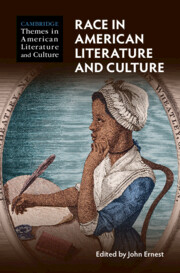Book contents
- Race in American Literature and Culture
- Cambridge Themes in American Literature and Culture
- Race in American Literature and Culture
- Copyright page
- Contents
- Contributors
- Acknowledgments
- Introduction
- Part I Fractured Foundations
- Part II Racial Citizenship
- Part III Contending Forces
- Part IV Reconfigurations
- Part V Envisioning Race
- Part VI Case Studies
- Part VII Reflections and Prospects
- Chapter 24 What Is Missing?
- Chapter 25 Traditions, Communities, Literature
- Chapter 26 Children of the Future
- Chapter 27 Presidential Race
- Index
Chapter 24 - What Is Missing?
Black History, Black Loss, and Black Resurrectionary Poetics
from Part VII - Reflections and Prospects
Published online by Cambridge University Press: 26 May 2022
- Race in American Literature and Culture
- Cambridge Themes in American Literature and Culture
- Race in American Literature and Culture
- Copyright page
- Contents
- Contributors
- Acknowledgments
- Introduction
- Part I Fractured Foundations
- Part II Racial Citizenship
- Part III Contending Forces
- Part IV Reconfigurations
- Part V Envisioning Race
- Part VI Case Studies
- Part VII Reflections and Prospects
- Chapter 24 What Is Missing?
- Chapter 25 Traditions, Communities, Literature
- Chapter 26 Children of the Future
- Chapter 27 Presidential Race
- Index
Summary
This essay explores how poets respond to the re:memory project of slavery and its many refracted afterlives. Can a resurrectionary poetics stitch the ephemerality and partiality of Black pasts into a quilt of recovery? This essay suggests that Black poets join historians in employing “new methodologies that disrupt” and enlarge “conventional historical processes and methods,” to extend from Marisa Fuentes. In their ongoing turns to the past, such poets resurrect disremembered histories, demonstrating how poetry can burst past history’s (archival and methodological) boundaries to offer both new work and methods that influence public memory. In its focus on Tiana Clark’s “Conversations with Phillis Wheatley” poems in her debut collection, I Can’t Talk about the Trees without the Blood (2018), this piece examines how Clark is in conversation with Wheatley and also with scholars who engage (spiritual and theoretical) space that holds both missing and surviving historical remnants. Finally, this essay is a meditation on Black loss and longing. What’s missing in the archives of Black history is an endless series of lost and unpreserved papers and missing objects. For Black communities, “missing” is not only items that weren’t preserved in repositories; what’s missing is also archival ache and historical longing over time.
Keywords
- Type
- Chapter
- Information
- Race in American Literature and Culture , pp. 397 - 409Publisher: Cambridge University PressPrint publication year: 2022
- 1
- Cited by

